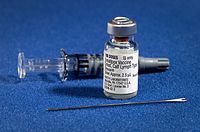
Photo from wikipedia
Introduction Vaccination coverage levels of the National Immunisation Program (PNI) in Brazil ranges from 80% to 95%, suggesting that parental acceptance of these vaccines is high. In 2014, HPV vaccine… Click to show full abstract
Introduction Vaccination coverage levels of the National Immunisation Program (PNI) in Brazil ranges from 80% to 95%, suggesting that parental acceptance of these vaccines is high. In 2014, HPV vaccine was introduced in the PNI. We conducted a survey to estimate parental acceptance of HPV vaccine and its determinants. Methods This was a random digit calling telephone survey performed in seven large cities from all five regions in Brazil. Eligible parents had to have one or more child less than 18 years old. We selected at least 100 subjects in each city. A standardised questionnaire was used to collect sociodemographic informationa and data on knowledge, attitudes and practices related to HPV vaccine, cervical cancer and HPV. Trained personnel conducted the interviews that lasted on average 20 min. Results Overall 826 parents were included in the survey (73% response rate). Parental acceptance for vaccinating against HPV was similarly high for female or male children, 92.8% and 91.7%, respectively. It did not change significantly among the cities studied (range 86.3%–95.5%). Parents’s main reasons to give the HPV vaccine to their children were: “Vaccines are good/important”(85.6%), “Prevents cervical cancer”(6.6%), and “Vaccine is in the PNI”(3.3%). Only 0.7% reported “Prevents genital warts”. Among parents with girls eligible for HPV vaccination (10–14 years old) under the PNI (n=291), 71.4% had their daughters vaccinated. Conclusion Parental acceptance of HPV vaccine is high (92%%), but a lower percentage results in actual vaccination. Moreover, the main reason to vaccinate is based on a vague assumption (“vaccines are good/important”). Only few parents reported that HPV vaccination prevents cervical cancer. Parents whose vaccine acceptance is ill founded and based on poor knowledge are more vulnerable to change their mind when challenged by stress related mass reactions to HPV vaccine reported by the media or when facing false arguments against vaccination by anti-vax reports.
Journal Title: Sexually Transmitted Infections
Year Published: 2017
Link to full text (if available)
Share on Social Media: Sign Up to like & get
recommendations!